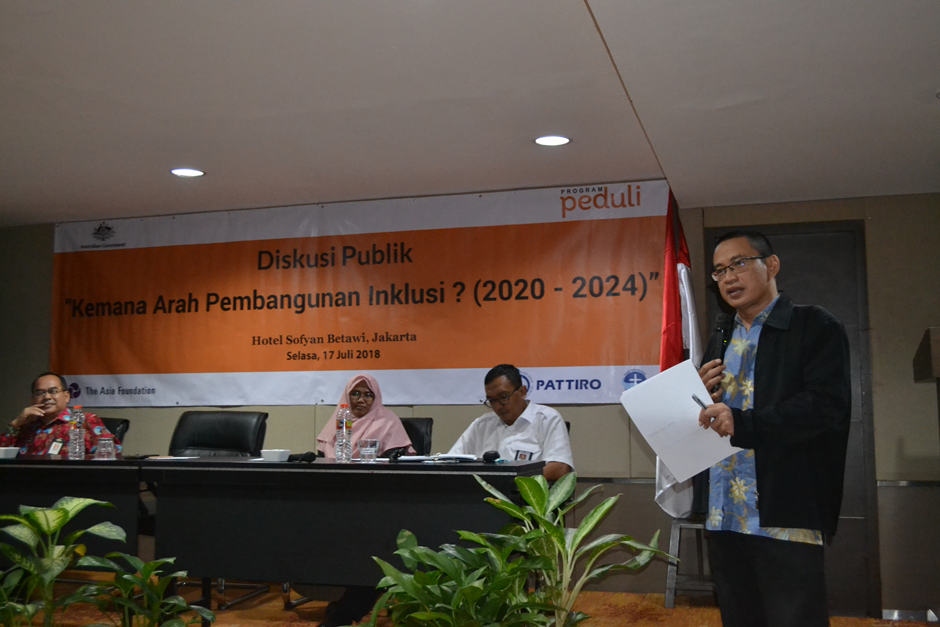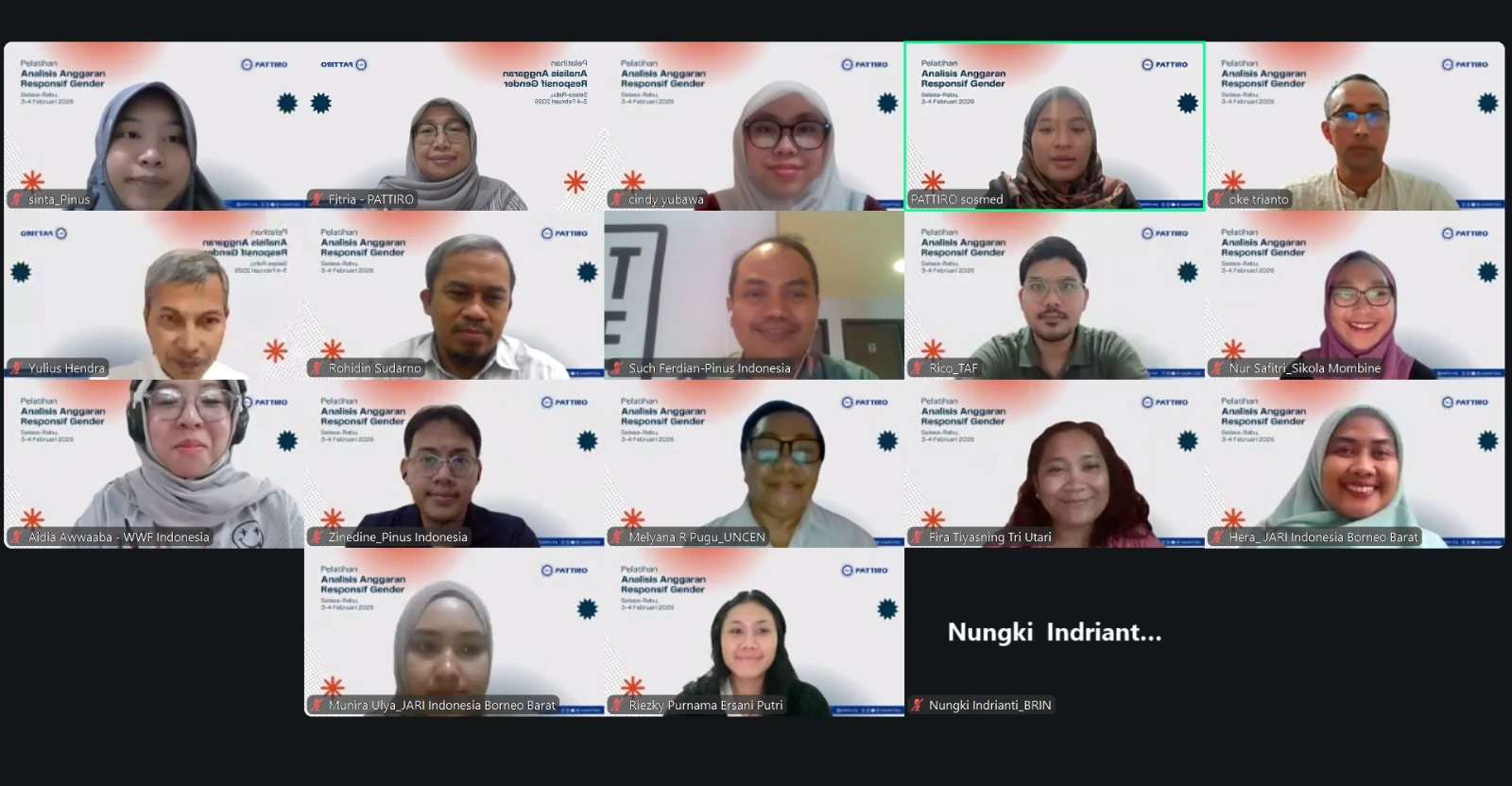
PATTIRO has conducted a study of good practices related to disability data collection and disability-friendly public services in 6 cities/districts in 6 provinces. This good practice study is supported by YAKKUM, The Asia Foundation, and the Australian Government through the Pillar Disability Care Program Phase 2. As a result of this study, PATTIRO has launched two books, namely Disability Data Collection Innovations and Public Services for Disabilities (5 June 2018). On the occasion of this book launch, Dr. Vivi Yulaswati, MSc, Director of Poverty Alleviation and Social Welfare at Bappenas said that Bappenas is currently preparing a background study RPJMN. Bappenas is also very open to getting input from various parties, including the community.
PATTIRO, in the results of its study, has found good practices that have been implemented in several regions that can contribute to inclusive development which will be designed in the 2020-2024 RPJMN. Therefore, PATTIRO took the initiative to respond to this opportunity by preparing a policy paper which began by looking at a portrait of the 2015-2019 RPJMN. On July 17 2018, PATTIRO held a Public Discussion of the Findings of the 2015-2019 RPJMN Desk Review in the Social Welfare Sector with the theme “Where is Inclusive Development Heading? (2020-2024)”. This Public Discussion was held at the Sofyan Hotel, Jakarta. This activity is the first step in the process of preparing policy recommendations for the 2020-2024 RPJMN from civil society which will be submitted to Bappenas as the supervisor for the preparation of the RPJMN.
Maya Rostanty, Director of PATTIRO explained the findings of the 2015-2019 RPJMN review. According to him, recognition of disabilities is guaranteed by law. “There has been recognition of disability from the Indonesian government through ratifying the UN convention, so that it becomes part of a global community that is committed to making every effort to realize the elimination of all forms of discrimination and guarantee the participation of people with disabilities in every aspect of life. “For example, aspects of basic services, education, health, transportation, a decent living environment, social protection, disaster mitigation, employment opportunities, business, law, politics, citizenship, information and communication, and social systems in society,” explained Maya.
Maya further explained that the problems or challenges she found were related to fulfilling disability rights. “Persons with disabilities and the elderly often experience vulnerability because there are no policies that are structured, massive and supportive, then this triggers other problems with public and social services that are not inclusive. It is also an obstacle for people with disabilities to be independent. Another problem is that limited data regarding the whereabouts and condition of people with disabilities and the elderly is one of the reasons why the fulfillment of their rights is often neglected. “One of the challenges in providing access to services for people with disabilities is the limited capacity for understanding by the government and the general public about the diversity of conditions and existence of people with disabilities,” said Maya.
From the presentation given, Maya provided conclusions regarding the results of the 2015-2019 RPJMN analysis, namely: 1) Disability data collection is very important to carry out, because it is an ‘upstream’ problem so that people with disabilities can get access to services (The practice of data collection on study results can be used in-buy in to implement the mandate of Law No. 8 of 2016 and needs to be included specifically in the next RPJMN; 2) The strategy for mainstreaming disability issues in the sector and public service issues needs to be developed in order to create ownership from the Ministry of Public Service RB and sectoral K/L, taking into account sectoral regulations that have been issued previously; Developing a coordination mechanism is important to ensure that disability issues are mainstreamed into sectoral ministries/institutions and that mainstreaming in budget planning can be carried out well; 3) There is a gap in the implementation of inclusive development between national planning and regional implementation.
At the end of the presentation, Maya conveyed PATTIRO’s recommendations in the 2020-2024 RPJMN. “We also provide recommendations, including: 1) The importance of disability data collection being included explicitly in development strategies; 2) The importance of a mainstreaming strategy in sectoral public services (the RPJMN also includes disability issues; 3) The importance of developing an Inclusive Development Master Plan and developing a Coordination Forum as a basis for mainstreaming into sectoral public services and mainstreaming into budget planning; 4) A budget planning mechanism that is pro-disability can be implemented without having to introduce new tools, namely by using a budget tagging mechanism. “In order for this to be implemented, an inclusive Development Master Plan is needed, which will be derived by each K/L according to their main tasks and functions, discussed in the Coordination forum, activities and budgets prepared, budget tagging carried out, monitoring and evaluation carried out,” explained Maya.
Moris Nuaimi from Bappenas welcomed the proposals or recommendations for the 2020-2024 RPJMN submitted by Maya Rostanty. “Please make the recommendations as simple as possible and make the regulations clearer. In the context of planning and budgeting, when there are regulations, their implementation is not easy. Maybe publishing a book on gender-based planning and budgeting is still considered easy, but implementing it is quite difficult, especially for regional friends under the Ministry of Home Affairs. “We need people who can reduce policy regulations in the regions, for example regulations regarding villages,” said Moris.
The same thing was conveyed by Udan Suheli, Head of Sub-Directorate for Social Rehabilitation of Persons with Physical Disabilities, Ministry of Social Affairs. Udan stated that he agreed with the recommendations presented by Maya Rostanty. According to him, the recommendations in the 2015-2019 RPJMN which have not been implemented optimally need to be re-included in the 2020-2024 RPJMN. “Recommendations in the RPJMN have not been implemented optimally and need to be re-included in the 2020-2024 RPJMN, so several existing recommendations must still be re-included, including the social sector, increasing advocacy, policy regulations, mapping social protection in benefit schemes for people with disabilities. “, development of facilities and mechanisms, and development of infrastructure must be integrated for accessibility,” explained Udan.
Yusuf Kurniawan, Head of the Coordination Division for Policy Implementation and Evaluation of Public Services at the Ministry of Administrative and Bureaucratic Reform, stated that he agreed with Maya Rostanty’s explanation. “There are many innovations that have been carried out by OPD related to providing services for people with disabilities. “One example is the Civil Registration Population Service which is proactive in visiting service users with special needs when recording e-KTP or other population data,” said Yusuf.
Yusuf also added that several things related to regulations and socialization need to be repeated continuously and further improved because socialization to improve special needs services is still very minimal in the regions.
Responding to what Yusuf said, Novita Anggraini, Program Manager at PATTIRO added that understanding disability friendly in society is expensive. “The understanding seems to be wrong, there is no need for special costs, just the cost of existing equipment. Apart from that, understanding of service personnel must also be mainstreamed. While in the field, we also found that many buildings or Regional Hospitals or Community Health Centers had been built regarding this accessibility but many were not used (just guessing the size or standard) even though there is already a standard from PUPR,” said Novi.
At the end of the event, Maya Rostanty as Director of PATTIRO expressed her gratitude for the participants’ contribution to this discussion activity. It could be said that almost 90% of the participants who contributed provided responses and input for the 2020-2024 RPJMN recommendations. “We hope that the RPJMN for the next five years will be an important matter for providing input and it is hoped that these recommendations will become policy,” said Tanty.
Contributor: Diah Mardhotillah/Fitria




